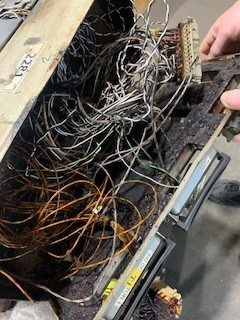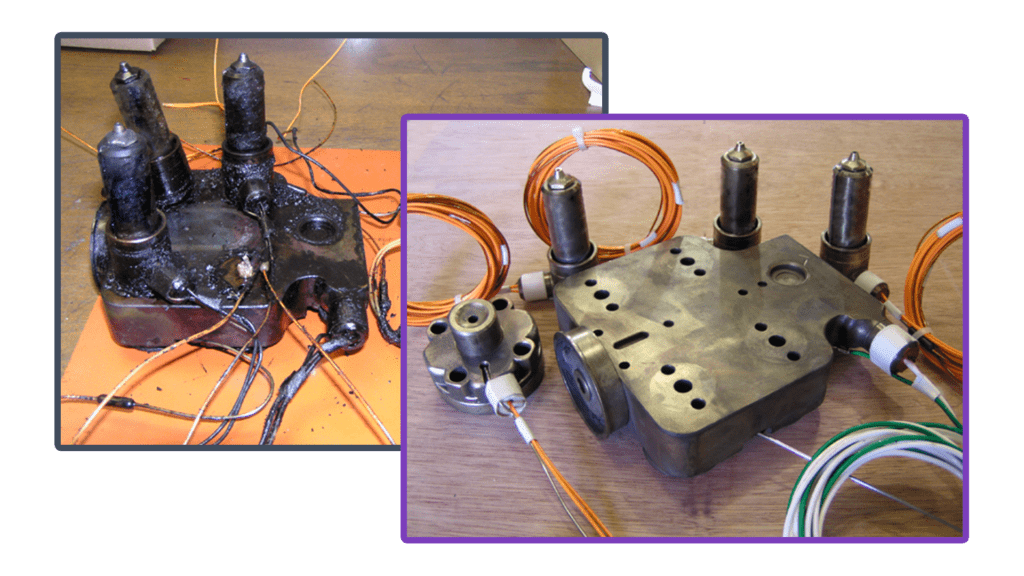Hot Runner Part Refurbishment: Common Signs of Wear
Hot runner systems are pivotal for enhancing efficiency and ensuring high-quality production. These systems facilitate the delivery of molten plastic to mold cavities, significantly reducing waste and cycle times. Like all mechanical systems, and given their high stress job, hot runners are susceptible to wear over time. Recognizing early signs of deterioration in components such as nozzle tip insulators, nozzle housings, nozzle heaters, thermocouples, and valve pins is crucial for maintaining optimal performance and preventing costly downtime.

Contact +1 (908) 281-0055 or sales@polymercleaning.com to discuss your Hot Runner Systems today! The experts in Hot Runner Part Refurbishment, System Repair, and Maintenance.
Nozzle Tip Insulators
Nozzle tip insulators are essential for maintaining temperature stability and preventing heat loss during the injection process. Over time, these insulators can exhibit signs of wear that may compromise the efficiency of the hot runner system.
Common Signs of Wear:
Cracking or Chipping: Thermal cycling can cause the insulator material to develop cracks or chips, leading to heat loss and inconsistent molding.
Discoloration: Prolonged exposure to high temperatures and molten plastic can cause discoloration, indicating material degradation.
Deformation: Physical deformation or warping can occur due to excessive heat or pressure, affecting the alignment and sealing of the nozzle tip.
Cracks or chips in nozzle tip insulators can lead to uneven heating, resulting in defects such as short shots or flash in molded parts. Discoloration often signals that the insulator material has been compromised, potentially leading to reduced thermal resistance and efficiency. Deformation can disrupt the precise alignment required for effective sealing, leading to material leakage and contamination. Regular inspection and timely replacement of worn insulators are essential to maintain the integrity of the molding process.
Nozzle Heaters
Nozzle heaters are critical for maintaining the necessary temperature of the nozzle to ensure consistent flow of molten plastic. Wear in these components can lead to temperature fluctuations and affect product quality.
Common Signs of Wear:
Inconsistent Heating: Uneven or insufficient heating can result from internal resistance changes or damage to the heating element.
Physical Damage: Cracks, dents, or other physical deformities can impair the heater’s functionality.
Electrical Failures: Short circuits or open circuits within the heater can lead to complete failure or erratic performance.
Inconsistent heating due to worn nozzle heaters can cause variations in melt viscosity, leading to defects such as sink marks or voids in the final product. Physical damage to the heater can result in hotspots or complete failure, necessitating unscheduled downtime. Regular electrical testing, including resistance and continuity checks, can help identify potential failures before they impact production. Upgrading to high-quality heaters can enhance durability and performance.
Nozzle Housings
Nozzle housings serve as the structural support for the nozzle assembly, ensuring proper alignment and delivery of molten plastic. Wear in these components can significantly impact the performance of the hot runner system.
Common Signs of Wear:
Surface Erosion: Continuous contact with high-temperature molten plastic can erode the internal surfaces, leading to dimensional inaccuracies.
Thread Damage: Frequent assembly and disassembly can cause wear or stripping of threads, compromising the secure fit of nozzle components.
Corrosion: Exposure to certain polymers or additives can lead to chemical corrosion, weakening the housing material.
Surface erosion within nozzle housings can alter the flow characteristics of molten plastic, resulting in inconsistent fill patterns and potential defects in molded parts. Damaged threads can prevent proper assembly, leading to misalignment and potential leakage. Corrosion not only weakens the structural integrity of the housing but can also introduce contaminants into the molded product. Implementing regular maintenance schedules and using compatible materials can mitigate these issues and prolong the lifespan of nozzle housings.
Thermocouples
Thermocouples are sensors used to measure temperature within the hot runner system, providing critical feedback for process control. Wear or damage to thermocouples can lead to inaccurate temperature readings and process instability.
Common Signs of Wear:
Drift in Readings: Gradual changes in temperature readings without corresponding process changes can indicate sensor degradation.
Physical Damage: Kinks, cuts, or abrasions to the thermocouple wires can affect signal integrity.
Loose Connections: Corroded or loose connectors can lead to intermittent or erroneous readings.
Drift in thermocouple readings can lead to improper temperature control, affecting the quality and consistency of molded parts. Physical damage to thermocouple wires can introduce noise into the signal, leading to unstable temperature control. Ensuring secure and clean connections, along with regular calibration, can maintain the accuracy and reliability of temperature measurements. Implementing a preventive maintenance plan that includes regular inspection and testing of thermocouples is essential for consistent process control.
Valve Pins
Valve pins control the opening and closing of gates in valve-gated systems. Wear can affect their sealing capability and movement.
Common Signs of Wear:
Scoring or Scratches: Indicates friction or misalignment.
Coating Degradation: Protective coatings may wear away, increasing friction and reducing lifespan.
Residue Accumulation: Polymer residue can build up, causing sticking or inconsistent movement.
Scoring or scratches on valve pins indicate excessive friction or misalignment, which can lead to uneven gate operation and defects in molded parts. Bending or warping can cause improper seating of the pin, affecting flow control and creating flash or short shots. Protective coatings are crucial for reducing friction and extending the lifespan of valve pins; their degradation increases wear rates and reduces efficiency. Residue accumulation can result in sticking or delayed movement, causing process inconsistencies. Regular maintenance and proper material selection can help mitigate these issues and ensure reliable performance.
Manifold Channels
The manifold distributes molten plastic to various nozzles in the hot runner system. Wear in manifold channels can lead to flow imbalances and product defects.
Common Signs of Wear:
Material Buildup: Accumulation of degraded plastic can obstruct flow paths.
Surface Corrosion: Chemical attack from certain polymers can corrode channel surfaces.
Warping: Thermal stresses can cause deformation, affecting flow balance.
Material buildup in manifold channels can cause flow restrictions, leading to inconsistent cavity filling and defective parts. Surface corrosion weakens the internal structure of the manifold, potentially resulting in contamination and failure of the hot runner system. Warping due to thermal stresses can cause misalignment between channels, leading to uneven distribution of molten plastic. Routine cleaning and maintenance of manifold channels are essential to prevent these issues and maintain optimal performance.
Polymer Cleaning Technology: A Leading Provider of Hot Runner Part Sales, Refurbishment, and General Hot Runner Maintenance
Contact +1 (908) 281-0055 or sales@polymercleaning.com to discuss your Hot Runner Systems today! Experts in Hot Runner System Repair and Maintenance for all OEM.

Polymer Cleaning Technology is a global leader in hot runner part refurbishment and cleaning. Our advanced cleaning technology ensures the removal of polymer residue, oxidation, and contaminants, restoring parts to optimal performance. We specialize in:
- Hot runner part refurbishment
- Nozzle and manifold cleaning
- Heater and thermocouple diagnostics and repair
Hot Runner Maintenance and Custom Parts Production
Regular hot runner maintenance is essential to prolonging the lifespan of components and ensuring consistent production quality. Our team provides comprehensive maintenance services, including preventative inspections, part cleaning, and refurbishment. Additionally, we manufacture custom hot runner parts to meet the unique specifications of your molding system. Find out more by contacting Polymer Cleaning Technology at (908) 281-0055 or sales@polymercleaning.com
By investing in routine maintenance and high-quality refurbishment, manufacturers can minimize downtime, reduce scrap rates, and optimize overall efficiency in plastic injection molding.
*This information is to be used as a general guideline only. Speak to your system manufacturer directly for verified information regarding your Hot Runner System.
For more in-depth insights into hot runner parts, visit us at www.PolymerCleaning.com, or give us a call at (908) 281-0055.

Find this information useful? Share with friends & colleagues:
Contact Information:
Polymer Cleaning Technology, Inc.
sales@polymercleaning.com
+1 (908) 281-0055
